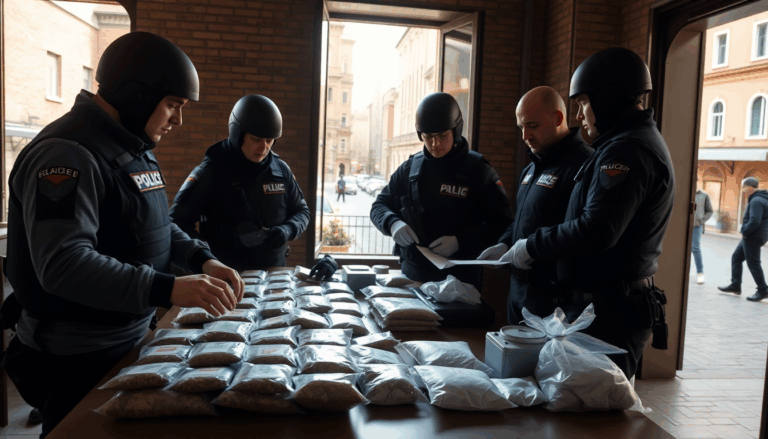The fight against drug trafficking is a daunting challenge for law enforcement agencies throughout Italy. A recent operation by the Mobile Squad of Padova shines a light on the complexities of this issue, resulting in the arrest of a Moroccan national and the seizure of significant amounts of hashish and cocaine. This incident
not only showcases the effectiveness of investigative efforts but also underscores the urgent need for a more strategic approach to tackling organized crime.
Spotting Emerging Trends in Drug Trafficking
As the landscape of drug trafficking continually shifts, it’s crucial for authorities to stay one step ahead. On July 14, investigators from the Mobile Squad noticed some unusual behavior near a supermarket in the Arcella area. Why was a vehicle making repeated
stops without the driver ever getting out? Their suspicions were piqued, leading them to dig deeper. It’s fascinating how what seems like innocent behavior can often conceal something more nefarious, and this case was no exception.
Upon closer examination, investigators discovered that the vehicle’s registered owner had rented a second residence that seemed unoccupied. This raised eyebrows—how could someone with only a part-time
job afford such expenses, including rent and a luxury vehicle? These anomalies served as crucial red flags, prompting agents to conduct a more targeted search.
The Financial Stakes: A Business Case
When law enforcement entered the second property, they uncovered astonishing results. Approximately 30 kilograms of hashish and 10 kilograms of cocaine were hidden in bags and backpacks, alongside €64,000 in cash and a variety of packaging materials. The potential market value of these illicit substances was staggering—over €1 million for the cocaine and €500,000 for the hashish. This operation not only highlights the substantial financial stakes involved in drug trafficking but also the significant hurdles law enforcement faces in addressing this persistent issue.
This bust not only led to the suspect’s arrest but also stressed the importance of monitoring financial flows and consumer behaviors among suspected traffickers. The ability to piece together information through data analysis is crucial for the success of operations like this one. It’s clear that law enforcement must effectively leverage technology and analytics to stay ahead in this ongoing battle.
Implementing Strategic Responses
This case exemplifies the multifaceted challenges that law enforcement encounters in the fight against drug trafficking. A comprehensive approach is essential—one that combines intelligence gathering, field investigations, and rigorous data analysis. The Padova operation is just one of many examples where authorities are striving to keep pace with the ever-evolving tactics of traffickers.
To bolster their responses to drug trafficking, agencies can adopt several strategies. For instance, enhancing data-sharing systems across jurisdictions can significantly improve intelligence on drug routes and networks. Furthermore, integrating advanced analytics into investigative frameworks allows for a more proactive approach to identifying suspicious behaviors and financial irregularities. Imagine employing machine learning algorithms to detect patterns in consumer purchases or vehicle movements that might indicate trafficking activities—this could be a game-changer.
A Roadmap for the Future of Drug Law Enforcement
In conclusion, the Padova drug operation not only led to a significant seizure but also provided valuable insights into enhancing investigative practices. The ability to analyze data and respond swiftly to suspicious activities are critical components in the ongoing fight against drug trafficking. Each successful operation contributes to a more robust security framework within the country, paving the way for more effective strategies in the future.
Looking ahead, it’s essential for law enforcement agencies to remain vigilant against emerging trends in drug trafficking and adapt their strategies accordingly. Collaborating with technology experts and data analysts will be increasingly critical, ensuring that agencies are well-equipped to tackle the challenges posed by organized crime and protect our communities effectively. After all, safeguarding our neighborhoods is a collective responsibility, and it starts with informed, proactive law enforcement.

